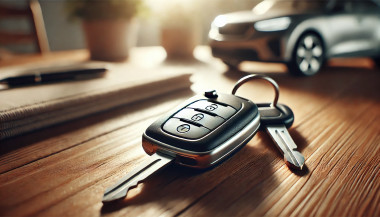When it comes to car ownership, many of us take pride in maintaining our vehicles. We keep up with oil changes, tire rotations, and insurance renewals. But there’s one crucial aspect that many drivers overlook: having a spare car key.
It might seem like a small detail, but nearly 40% of car owners don’t have a backup key for their vehicle. That’s a risk you might not want to take. Let’s explore why having a spare car key is so important and how it can save you time, money, and frustration.
The Hidden Risks of Having Only One Key
You may think that having just one car key is fine—after all, you always know where it is, right? But life has a funny way of surprising us, and car keys get lost or damaged more often than you might think. Here are some common risks you face when relying on just one key:
Lost Keys: Losing your only car key can leave you stranded. Whether you're in a rush for work or on your way to an important event, misplacing your key means you're stuck until you find it—or worse, until you get a replacement.
Key Damage: Keys, like anything else, wear out over time. A bent or broken key can cause problems with your car’s ignition, and if it's your only one, you’re in for a headache.
Lockouts: It’s easy to accidentally lock your keys inside your car. Without a spare key, you’ll need to figure out how to regain access—both costly and inconvenient.
Theft: If someone steals your key, not only are you locked out of your car, but you also face a potential security risk. A spare key can give you quick access and peace of mind while you handle the situation.
Why a Spare Key Is a Lifesaver
Having a spare key is more than just a backup plan; it’s a practical solution that can save you in many situations. Here’s why having a spare key should be on your to-do list:
Saves You Time: If you’ve ever lost a key, you know how time-consuming it can be to get a replacement. With a spare key, you can avoid the wait and get back on the road quickly.
Prevents Expensive Lockouts: Getting locked out of your car is stressful and costly. Emergency situations like this can cost you not just time but money, and depending on the circumstances, you might even need additional assistance.
Convenience for Multiple Drivers: If you share your car with a spouse, roommate, or family member, having a spare key allows both of you to have access without needing to coordinate every trip.
Peace of Mind: With a spare key, you won’t have to worry about the “what if” scenarios. It’s a simple safety net that ensures you’re never completely stranded.
Affordable Solutions for Replacing Your Car Key
You might be wondering how to go about getting a spare key. Fortunately, the process has never been easier or more affordable. Gone are the days when you had to rely on expensive or complicated processes to secure a replacement key.
Here are some practical ways to get a spare key:
Online Key Replacement Services: Many services offer easy, affordable options for getting a spare car key. Simply upload a photo of your key, and you’ll receive a replacement.
Automotive Dealerships: Dealerships provide spare keys for almost any car make or model. However, this option is often more costly and may require you to bring the car in for verification and programming.
How to Choose the Right Key Replacement Option
When deciding on how to get a spare key, consider these factors:
Cost: Depending on the service or method you choose, prices can vary. Evaluate your budget and the type of key your car requires before proceeding.
Convenience: For some, the most convenient option is one that doesn’t require in-person visits. Research which option offers the best balance between time and convenience for your needs.
Speed: Depending on your urgency, choose an option that fits your timeframe. Some services offer express options, while others may take longer.
Don’t Wait Until It’s Too Late
Many car owners don’t think about getting a spare key until they’re faced with an emergency. Don’t let that be you. Having a backup key is a small investment that can save you from significant stress and financial strain down the line.
Take action today and make sure you have a spare key for your vehicle. Whether it’s for a just-in-case moment or for daily convenience, having that extra key can make all the difference when you need it most.

_1736343521.jpg)

 (1)_1736344659.jpg)
_1752499596.jpg)
 (1)_1741183083.jpg)